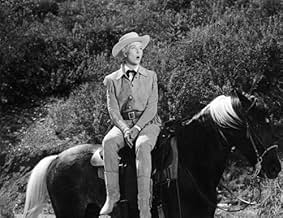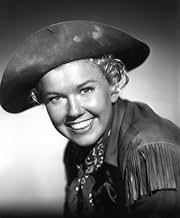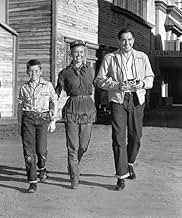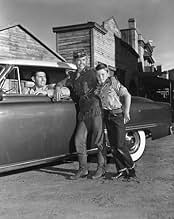IMDb-BEWERTUNG
7,2/10
11.610
IHRE BEWERTUNG
Die Geschichte von Calamity Jane, ihrem Saloon und ihrer Romanze mit Wild Bill Hickok.Die Geschichte von Calamity Jane, ihrem Saloon und ihrer Romanze mit Wild Bill Hickok.Die Geschichte von Calamity Jane, ihrem Saloon und ihrer Romanze mit Wild Bill Hickok.
- 1 Oscar gewonnen
- 2 Gewinne & 5 Nominierungen insgesamt
Allyn Ann McLerie
- Katie Brown
- (as Allyn McLerie)
Victor Adamson
- Barfly
- (Nicht genannt)
Fred Aldrich
- Chicagoan
- (Nicht genannt)
Leon Alton
- Townsman
- (Nicht genannt)
Monya Andre
- Woman at Fort Dance
- (Nicht genannt)
Beulah Archuletta
- Indian Woman in Saloon Balcony
- (Nicht genannt)
Emile Avery
- Barfly
- (Nicht genannt)
Mary Bayless
- Woman at Fort Dance
- (Nicht genannt)
George Bell
- Barfly
- (Nicht genannt)
Ray Bennett
- Officer at Fort Dance
- (Nicht genannt)
Arthur Berkeley
- Bartender
- (Nicht genannt)
Empfohlene Bewertungen
... who else could put across the Deadwoodstageis number like Doris Day in the opening sequences of this wonderful movie? Right through to her mushy ballad 'Secret Love' she is perfect for the role of the butch cowgirl who gets a feminine makeover and snares her shooting buddy (the excellent Howard Keel, in fine voice here). Doris was a true star, a great actress and singer, game for a laugh and a pretty blonde who transcended her rather trite public image through her talent. Calamity Jane is possibly her best work, and certainly one of the best musical movies of the 1950s (against some pretty stiff competition). They might be making musicals again, but they won't make them quite like this.
`Calamity Jane' is a film I love to take from the shelves when I'm feeling blue. It's so exuberant, so joyous, and so colourful that it cannot help but cheer you up!
Doris Day plays the role of her career as the rambunctious `Calam', the wildcat tomboy of Deadwood City. The fun starts when Calamity is sent to the `windy city' of Chicago to find a vaudeville beauty who will perform at the local bar. Instead of the genuine article, Calamity ends up with the star's ambitious maid, Katie, who decides to make her stab at fame in the star's place. Together, the two find fun, love, and a whole lot of catchy tunes.
Sure, the fascinating real-life historical figure Calamity Jane didn't look much like Doris Day - let alone Howard Keel, who is the last person you'd describe as `wild' - and Jane's transformation from independent homesteader to blushing housewife isn't what you'd call P.C., but if you're looking for reality, head to the Martin Scorsese section. This is light-as-a-feather entertainment done very well, and I can't help but love it!
Doris Day plays the role of her career as the rambunctious `Calam', the wildcat tomboy of Deadwood City. The fun starts when Calamity is sent to the `windy city' of Chicago to find a vaudeville beauty who will perform at the local bar. Instead of the genuine article, Calamity ends up with the star's ambitious maid, Katie, who decides to make her stab at fame in the star's place. Together, the two find fun, love, and a whole lot of catchy tunes.
Sure, the fascinating real-life historical figure Calamity Jane didn't look much like Doris Day - let alone Howard Keel, who is the last person you'd describe as `wild' - and Jane's transformation from independent homesteader to blushing housewife isn't what you'd call P.C., but if you're looking for reality, head to the Martin Scorsese section. This is light-as-a-feather entertainment done very well, and I can't help but love it!
First and foremost, CALAMITY JANE is a fun musical. The 29-year-old Doris Day thoroughly enjoys herself in the central role as a gun-totin' tomboy, the fastest draw in the city of Deadwood, South Dakota - apart from Wild Bill Hickok (Howard Keel). She demonstrates an apparently limitless capacity for telling tall stories, as well as a unique ability to ride a horse. She and Keel make a lovable double-act, especially in their song "I Can Do Without You" - which is of course completely ironic in tone. They clearly cannot do without one another, as proved at the end of the film when they celebrate their nuptials. Sammy Fain and Paul Francis Webster's score contains at least two classics, "The Deadwood Stage (Whip Crack-Away," which opens and closes the film, and "Secret Love," a typically schmaltzy Day song that topped the charts on its initial release. Yet perhaps the film's most interesting aspect today is the way in which it embodies early Fifties attitudes towards gender. Calamity Jane's decision to don male attire is perceived as something aberrant; she is tolerated by her fellow-citizens of Deadwood, but no one really takes her very seriously. It is only when she is 'educated' in feminine ways by visiting singer Katie Brown (Allyn McLerie) that she understands what her 'proper' role should be. She should accept that females (unlike males) are capricious in nature, apt to make spontaneous decisions without rhyme or reason. In a ball scene towards the end of the film, Calamity appears in a long gown, her blonde hair neatly tied at the back - the male guests stare at her in disbelief, as if they cannot believe they have a "true" woman within their midst. Calamity feels uncomfortable in the role, and returns briefly to her male attire; but when the citizens refuse to speak to her later on (punishing her for her decision to banish Katie from their town), she understands the "error" of her ways. At the film's end she wears a bridal gown and tosses her six-shooter away, in symbolic acknowledgment that she should no longer try to adopt masculine attitudes. Rather she should accept her designated role as wife and (probably) mother.
The film is marvelous, but it's been dissected to death; consequently, I can't add any comment you haven't already heard. Lovely Technicolor cinematography of the outdoor frontier and rich period costuming enhances this top-notch cornucopia of story, score, and songs- including 'The Deadwood Stage,' 'I Can Do Without You,' 'Windy City,' 'The Subject of Harry,' and 'Secret Love.' Two special moments for me are Howard Keel singing 'Higher Than A Hawk' to the portrait of Allyn McLerie, and 'A Woman's Touch,' which shows McLerie and Doris Day become sisters in solidarity. They clean the house (in fact, renovate it) while discovering Calamity's femininity at the same time. They joke, they bond, and at the end of the scene our heroine is in a dress and quite the looker. There's no shocking sexist message here; it's a musical showing how a woman gets her man. I don't think in 1953 you could've asked for more. On the other hand, most of Day's scenes with Keel are a locked-horns battle of the sexes- absolutely no question. They compliment each other beautifully- from 'I Can Do Without You', right up to their nearly romantic duet of 'The Black Hills of Dakota.' Enjoy the film again, and look between the lines- some of it is quite timeless.
For a film that is fifty years old 'Calamity Jane' still entertains. It is usually compared unfavorably to 'Annie Get Your Gun' but I always enjoy this more. Doris Day dominates the film; dressed in buckskin or in frills, toting a gun or wielding a broom, belting out a song or doing a pratfall. Certainly a high point of her varied career. Her sheer energy is breath taking and it is no wonder that the rest of the cast seem subdued in comparison. Even Howard Keel is a bit wooden.
The songs are great, scattered through the uncomplicated plot like jewels, from the bouncy 'Deadwood Stage' to the combative 'I Can Do Without You' to the under rated 'High As A Hawk' and climaxing with the anthemic 'Secret Love'. 'A Woman's Touch' is not proof to our modern cynicism (for good reason) but it is still jolly song.
Looking back we can give other readings of the film; the cross dressing, the gay resonances, the treatment of the native Americans, the ownership of land. Which may all be true but it is basically what it is, a colourful and tuneful film that can be enjoyed time after time. It is mighty pretty and on its own terms pretty mighty.
The songs are great, scattered through the uncomplicated plot like jewels, from the bouncy 'Deadwood Stage' to the combative 'I Can Do Without You' to the under rated 'High As A Hawk' and climaxing with the anthemic 'Secret Love'. 'A Woman's Touch' is not proof to our modern cynicism (for good reason) but it is still jolly song.
Looking back we can give other readings of the film; the cross dressing, the gay resonances, the treatment of the native Americans, the ownership of land. Which may all be true but it is basically what it is, a colourful and tuneful film that can be enjoyed time after time. It is mighty pretty and on its own terms pretty mighty.
Wusstest du schon
- WissenswertesDoris Day recorded the song "Secret Love" in only one take.
- PatzerAfter leaving the ball at the fort, we cut to a shot of Calamity's bare back as she is undressing. Once she gets the dress off she is shown wearing undergarments that clearly cover most of her back.
- Zitate
[the singer is a man in drag]
Wild Bill Hickok: She ain't very good lookin'
Calamity Jane: That ain't all she ain't.
- Alternative VersionenThere is an Italian edition of this film on DVD, distributed by DNA Srl: "AMORE SOTTO COPERTA (1948) + CALAMITY JANE (Non sparare baciami, 1953)" (2 Films on a single DVD), re-edited with the contribution of film historian Riccardo Cusin. This version is also available for streaming on some platforms.
- VerbindungenFeatured in The Doris Mary Anne Kappelhoff Special (1971)
- SoundtracksThe Deadwood Stage (Whip-Crack-Away)
Written by Sammy Fain
Lyrics by Paul Francis Webster
Sung and whistled by chorus behind credits, then sung by Doris Day and chorus
Top-Auswahl
Melde dich zum Bewerten an und greife auf die Watchlist für personalisierte Empfehlungen zu.
Details
Box Office
- Weltweiter Bruttoertrag
- 9.215 $
- Laufzeit1 Stunde 41 Minuten
- Seitenverhältnis
- 1.37 : 1
Zu dieser Seite beitragen
Bearbeitung vorschlagen oder fehlenden Inhalt hinzufügen

Oberste Lücke
By what name was Schwere Colts in zarter Hand (1953) officially released in India in English?
Antwort

































